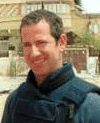Reporters Without Borders 30 July 2003
In a report issued today on the Israeli army’s enquiries into the fatal shootings of two journalists in the Occupied Territories in April and May, Reporters Without Borders accuses the military of acting with a flagrant lack of rigour and determination and calls for proper investigations that could lead to the prosecution and punishment of those responsible.
Entitled “Israeli army’s attitude : Regret, but no real enquiries and certainly no one punished,” the report looks at the military’s response to the deaths of Palestinian cameraman Nazeh Darwazi in Nablus on 19 April and British documentary filmmaker James Miller in Rafah in the Gaza Strip on 2 May.

Nazih Darwazeh
The report finds that the enquiry into Darwazi’s death was botched. The witnesses were not interviewed although they were ready to talk. The authorities have not issued any report after more than three months. The military prosecutor has very probably closed the case although a military police investigation is required when a breach of regulations is suspected.

James Miller
Reporters Without Borders has established that Darwazi’s death was caused by an Israeli soldier firing a shot in conditions of poor visibility and without justification. It was very probably meant to be a warning shot, and criminal intent is ruled out. But the manner in which the shot was fired was a breach of regulations, and this is grounds for a military police investigation. If appropriate, both the soldier involved and his superior officer should be punished.
The organisation calls for more transparency and zeal on the part of the military authorities in Miller’s case. The weapons of the unit involved in the incident need to be tested urgently. Those initially provided for testing appear not to have been the right ones. And according to the established procedure, the military prosecutor should assign the investigation to the military police as there is every reason to suspect a breach of regulations.
If, as the report says, there are no grounds for claiming in either case that the Israeli soldiers involved acted in legitimate self-defence, the army must punish those responsible for these acts of negligence, mistakes or abuses with fatal consequences. And it is imperative that these punishments are made public so that journalists can work in the Occupied Territories without fearing for their lives.
Combatting the feeling of impunity prevailing among many Israeli soldiers today and ensuring the safety of journalists and press freedom in the Israeli-Palestinian conflict depend on this.
The deaths of Darwazi and Miller brought the number of journalists killed in the Occupied Territories since September 2002 to five. Some 60 journalists have been injured by gunfire since the start of the second Intifada.
To download the full report click here.